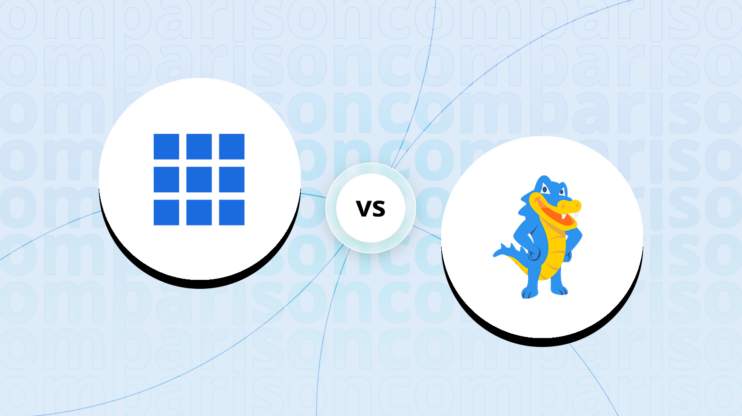Siteground vs Dreamhost: Final verdict
Looking over SiteGround vs. DreamHost, it’s clear why both hosts are so popular. They have both hosted millions of
websites that run on WordPress for decades, building up a loyal customer base.
-
SiteGround (Overall grade: 8.8)
shines with its high uptime, advanced performance, and superior user support. It offers a variety of hosting types, including shared, cloud, WordPress, eCommerce, and VPS hosting, making it versatile for different user requirements. Its use of Google Cloud ensures reliability, speed, and enhanced site performance through advanced caching technologies and a global CDN. Security is also robust with AI anti-bot systems, smart WAF, and daily backups. However, SiteGround’s higher initial pricing and renewal rates can be a drawback for some users. Despite this, it remains a top choice for users prioritizing performance and customer service. -
DreamHost (Overall grade: 8.2)
is known for its affordability, extensive storage options, and a comprehensive 100% uptime guarantee. It provides shared, cloud, WordPress, VPS, and dedicated hosting, catering well to multimedia and growing business needs. Its user-friendly control panel, free domain registration for the first year, and scalable resources are significant advantages. DreamHost offers strong security measures, including DDoS protection and malware scanning, but lacks some of the advanced caching and scaling options present in SiteGround. The absence of direct phone support and occasional slower customer service response times are areas needing improvement. Still, DreamHost is a solid option for those seeking economical and reliable hosting solutions with excellent basic and intermediate features.
 Overall grade:8.8 |
 Overall grade:8.2 |
|
|---|---|---|
| Uptime and Availability | 9.4 | 8.5 |
| Hosting Performance | 8.8 | 7.8 |
| Hosting Security | 8.6 | 7.8 |
| Price | 8.4 | 8.2 |
| Hosting Features | 8.5 | 7.9 |
| Ease Of Setup | 8.9 | 8.9 |
| User Management | 8.4 | 8.1 |
| Customer Support | 9.2 | 8.3 |
| User feedback | 4.3/5 | 4/5 |
Hosting types offered
Both platforms provide a variety of hosting types, each designed to meet the different needs of users.
 |
 |
|
|---|---|---|
| Shared hosting | ||
| Cloud hosting | ||
| WordPress hosting | ||
| Ecommerce hosting | ||
| VPS hosting | ||
| Dedicated hosting |
Although both offer a variety of hosting plans tailored to different needs, in
certain cases, one platform may prove to be more suitable.
Detailed comparison
Uptime and availability
Evaluates the average uptime statistics, uptime guarantee and overall availability of the hosting
provider
Score Components:
- Uptime percentage (30%): evaluates the uptime statistics in given period of time
- Uptime guarantee (20%): Assesses if the platform offers an uptime guarantee and
whether the actual uptime matches the promised guarantee. - General performance (25%): Evaluates how fast is the average response time and overall
it’s stability. - Responsiveness (10%): Adaptability to different devices and screen sizes.
- Availability (25%): Reflects the total downtime and number of outages.
 9.4
9.4
 8.5
8.5
🏆 Winner
SiteGround: Exceptional uptime and availability with impressive performance and support.

SiteGround excels in uptime and reliability, boasting a 99.9% uptime guarantee with generous compensation if this isn’t met. Over nearly two months, it maintained a stellar 99.99% uptime, proving its stability. Fast response times and efficient handling of user traffic under stress highlight its performance capabilities.

DreamHost offers a 100% uptime guarantee, with compensation for any downtime. Performance tests have shown stable and reliable service, though with slightly higher response times compared to SiteGround. Its infrastructure and user-friendly control panel make it a good choice, although it scored lower in service tests over long periods.
Which one has better hosting performance?
Score Components:
- Hosting speed (30%): This includes SSD quality, Load times, PageSpeed score ranges,
additional information on website speed, built-in plugins for performance enhancement, available caching
methods, and CPU/RAM options - CDN (20%): Considers whether CDN is available or not, whether it’s free or paid, and
the quality of the CDN service - Available data centers (30%): Evaluates the number of data centers and their locations
globally. - Scalibility (20%): Looks at whether elastic scaling is available, the process required
to scale (manual upgrade vs. automatic scaling), the presence of dedicated servers, and the costs
associated with scaling.
 8.8
8.8
 7.8
7.8
🏆 Winner: SiteGround: Offers superior hosting performance and customer support.
When comparing general performance, SiteGround stands out due to its premium infrastructure built on Google Cloud, ensuring high reliability, security, and speed. Their ultrafast server setup, including a custom implementation of PHP and MySQL, significantly enhances website performance. Additionally, SiteGround boasts extensive caching methods such as static and dynamic caching with NGINX-based dynamic cache and Memcached service, leading to faster site speeds. They offer a free CDN service with over 170 CDN edge locations globally, a significant advantage over DreamHost’s unspecified CDN quality. SiteGround also benefits from multiple data center locations with the newest SSD disks, which further contribute to its superior performance. DreamHost, although competent with features like server-level caching and SSD storage for high performance, does not match SiteGround across these metrics.
Website Speed
SiteGround provides impressive website speeds through several technologies. Their ultrafast server setup, custom PHP, and MySQL implementations cut TTFB, resulting in a 30% faster page load time. The combination of static and dynamic caching, along with their in-house built CDN service, offers quick content delivery globally. DreamHost provides swift site speeds via SSD storage and server-level caching, but SiteGround’s integration of the latest technologies like Brotli, HTTP/2, and OCSP Stapling for further speed optimization edges out its competitor.
Scalability
In terms of scalability, SiteGround offers multiple plans and makes upgrading straightforward. Their GrowBig and GoGeek plans provide advanced features like a staging tool and caching services. For those needing more, SiteGround’s cloud plans start at $100.00/month and offer easy scalability. DreamHost allows for expandable RAM and storage with its plans, starting at $10.00/month for VPS hosting and $199.00/month for dedicated hosting. It supports various upgrades but lacks SiteGround’s high-end dedicated server options. Both providers support elastic scaling, although SiteGround’s variety of plans and explicit upgrading options make it slightly more versatile.
Which one has better security features?
and regulatory requirements
Score Components:
- Technical security measures (40%): This includes encryption, firewalls, DDoS
protection, secure configurations, server monitoring, access control and availability of security addons
(e.g Sitelock security). - Operational security measures (30%): Encompasses data privacy, backups and data
redundancy. - Compliance and certifications (20%): Adherence to legal and regulatory requirements
(e.g., GDPR, HIPAA) and possession of certifications (e.g., ISO 27001, SOC 2). - Business and reliability (10%): Factors in the provider’s reputation, uptime
guarantees, and customer support.
 8.6
8.6
 7.8
7.8
🏆 Winner SiteGround: A blend of advanced security and operational measures ensuring top-notch hosting security.
Both SiteGround and DreamHost have notable differences in their approaches to technical and operational security, as well as in their compliance with regulations.
Technical security measures:
SiteGround boasts several robust technical security measures, including an AI anti-bot system and a smart web application firewall (WAF) that is consistently updated to counter threats. Additionally, it offers daily and distributed backups, plus free SSL certificates automatically managed through Let’s Encrypt. DreamHost also provides free SSL certificates but goes further by allowing professionally-signed and third-party SSL certificates. While SiteGround emphasizes automated updates for WordPress and WooCommerce, DreamHost offers DDoS protection and malware scanning through DreamShield. Notably, both support secure file transfer via SFTP and SSH access but SiteGround’s multi-layered security managed by Google Cloud stands out.
Operational security measures:
SiteGround ensures 24/7 system administration and automatic daily backups, retaining up to 30 copies, with on-demand backups available for higher plans. DreamHost offers around-the-clock expert support and server monitoring along with multi-factor authentication (MFA) for enhanced panel security. Both services include automatic software updates to maintain security patches, but SiteGround further enhances its operational security with custom security solutions for WordPress and WooCommerce-specific vulnerabilities. DreamHost offers additional security through mod_security and password protection via .htaccess files.
Compliance and certifications:
Regarding compliance, SiteGround ensures GDPR compliance and takes measures to safeguard data with advanced tools such as phishing-resistant Security Keys. DreamHost is also GDPR compliant and maintains a Privacy Center for user data management. While DreamHost provides PCI compliance for its own sites, both providers do not assist customers with PCI compliance for their websites. Neither service supports HIPAA compliance for medical records.
 |
 |
|
|---|---|---|
SSL certificate |
Free SSL certificates |
Free SSL, professionally-signed certificates, third-party SSL, no wildcard SSL |
Additional security features |
AI anti-bot system, daily backups, WAF, multi-layered security |
Malware scanning (DreamShield), DDoS protection, MFA, mod_security |
PHP versions |
Not specified |
Supports current PHP versions, including PHP 8 |
GDPR compliance |
Yes |
Yes |
HIPAA compliance |
Not HIPAA compliant |
Not HIPAA compliant |
PCI compliance |
Not PCI compliant for any hosting plan |
PCI compliant for its own sites and servers, not for customer websites |
Hosting features
Score Components:
- Domains (20%): Assesses the availability of a free domain, domain purchase options, and
pricing - Email (15%): Considers if the provider offers full email hosting, or is reselling
third-party service, and if the email is only transactional or not - Website builder (15%): Checks if website builder is available, and it’s user
friendliness and overall the level of customization allowed. - Staging environment (20%): Determines if a staging environment is available, allowing
for testing changes before going live. - FTP & SFTP accounts (10%): Evaluates if and how easily users can access FTP and
SFTP accounts - Git and SSH access (20%): Assess whether Git is integrated into the hosting service and
if SSH access is provided
 8.5
8.5
 7.9
7.9
🏆 Winner
SiteGround: A versatile hosting solution with a focus on performance and customer satisfaction.
When comparing SiteGround and DreamHost, both provide a suite of compelling features, yet they cater to different user needs. SiteGround offers a user-friendly website builder that supports complex customization, making it easier for users to create visually appealing and functional websites without extensive technical know-how. One key advantage of SiteGround is its extensive free services, such as free SSL, daily backups, and a CDN, which can significantly reduce overall costs. Additionally, SiteGround includes automated WordPress updates, making it a great option for WordPress-based sites. Notably, SiteGround’s use of premium Google Cloud and their built-in SuperCacher technology ensures fast, reliable performance.
DreamHost, on the other hand, stands out with its Shared Starter and Shared Unlimited plans, offering unlimited storage and bandwidth at very competitive prices. DreamHost also provides a free domain registration for the first year, a key selling point for new users aiming to establish their online presence without incurring extra costs upfront. The availability of a custom-built control panel and an impressive 100% uptime guarantee further enhance user convenience and reliability. Moreover, DreamHost supports privacy through WHOIS protection at no additional cost and offers robust VPS and dedicated hosting options for growing businesses that require scalable resources.
 |
 |
|
|---|---|---|
Free domain |
No |
Yes, for the first year |
Free SSL |
Yes |
Yes |
Email hosting |
Yes |
Yes |
Website builder |
Yes |
Yes |
Staging environment |
Yes |
Yes (for DreamPress) |
FTP & SFTP accounts |
Yes |
Yes |
Git and SSH access |
Yes |
Yes |
Free backup |
Yes |
Yes |
Money back guarantee |
Yes, 30 days |
Yes |
a location.
As a result in rare cases the features mentioned here can differ from the ones you see on their websites.
Both providers support a range of users from beginners to experts with user-friendly website builders and WordPress staging areas. However, in terms of developer tools, both SiteGround and DreamHost offer robust options including SSH access, support for multiple programming languages, and Git for version control, thus appealing to developers looking for advanced capabilities.
Email services:
Both SiteGround and DreamHost provide comprehensive email hosting, including professional email addresses and unlimited email accounts for custom domains. SiteGround focuses on ease of setup with free email accounts and security measures like spam filtering and security protocols. DreamHost also offers robust email hosting as part of its packages and allows users to integrate third-party email services if desired. Each provider ensures that users can manage transactional emails effectively for activities such as form submissions. DreamHost’s standout feature is its commitment to privacy, reflected in its free WHOIS privacy protection, offering an additional layer of security for user data.
Price
Score Components:
- Plan value (40%): What each pricing tier offers.
- Transparency and clarity (30%): Clearness of pricing structures.
- Flexibility of plans (20%): Range of options to suit different budgets.
- Hidden costs (10%): Additional expenses not included in the plan.
 8.4
8.4
 8.2
8.2
🏆 Winner
SiteGround: Providing a rich set of features at competitive prices.
Evaluating the pricing of plans among various hosting providers can be complex due to their differing pricing and renewal strategies. Additionally, certain plans require annual commitments, which adds to the difficulty of making comparisons. The prices listed are based on monthly commitments; plans requiring annual commitments are indicated. Additionally, although some providers offer identical plans for WordPress and shared hosting, we have created separate tables for each to enhance clarity.
When comparing SiteGround and DreamHost, SiteGround offers more comprehensive features across its tiered plans at competitive prices. SiteGround’s discounted plans provide extensive features like managed WordPress, on-demand backup copies, and enhanced security. On the other hand, DreamHost offers unlimited storage and a lower entry point cost for shared hosting. For cloud hosting, SiteGround’s tiered pricing caters to various enterprise needs with distinct CPU and storage options, while DreamHost emphasizes scalable solutions with customizable cloud computing.
 |
 |
|---|---|
|
StartUp Plan $17.99/mo.
1 website, 10 GB web space, ~10,000 visits monthly, unmetered traffic, free WP installation, free WP migrator, WordPress autoupdates, free SSL, daily backup, free CDN, free email, enhanced security, ecommerce enabled, WP-CLI and SSH, managed WordPress, out-of-the-box caching, unlimited databases, 100% renewable energy match, 30-days money-back, add collaborators. Value for price:8.4
|
DreamPress $19.99/mo.
1 WordPress website, free domain registration, ~100K monthly visitors, unmetered bandwidth, 30GB SSD storage, built-in caching, automated daily backups, on-demand backups & 1-click restore, 24/7 WordPress specialized support. Value for price:8.2
|
|
GrowBig Plan $29.99/mo.
Unlimited websites, 20 GB web space, ~100,000 visits monthly, unmetered traffic, free WP installation, free WP migrator, WordPress autoupdates, free SSL, daily backup, free CDN, free email, enhanced security, ecommerce enabled, WP-CLI and SSH, managed WordPress, out-of-the-box caching, unlimited databases, 100% renewable energy match, 30-days money-back, add collaborators, on-demand backup copies, 30% faster PHP, staging. Value for price:8.6
|
DreamPress Plus $34.99/mo.
1 WordPress website, free domain registration, ~300K monthly visitors, unmetered bandwidth, 60GB SSD storage, built-in caching, automated daily backups, on-demand backups & 1-click restore, 24/7 WordPress specialized support. Value for price:8.4
|
|
GoGeek Plan $44.99/mo.
Unlimited websites, 40 GB web space, ~400,000 visits monthly, unmetered traffic, free WP installation, free WP migrator, WordPress autoupdates, free SSL, daily backup, free CDN, free email, enhanced security, ecommerce enabled, WP-CLI and SSH, managed WordPress, out-of-the-box caching, unlimited databases, 100% renewable energy match, 30-days money-back, add collaborators, on-demand backup copies, 30% faster PHP, staging + Git, white-label clients, free private DNS, highest tier of resources, priority support. Value for price:8.8
|
DreamPress Pro $89.99/mo.
1 WordPress website, free domain registration, ~1M monthly visitors, unmetered bandwidth, 120GB SSD storage, built-in caching, automated daily backups, on-demand backups & 1-click restore, 24/7 WordPress specialized support, priority support. Value for price:8.6
|
 |
 |
|---|---|
|
StartUp Plan $17.99/mo.
1 website, 10 GB web space, ~10,000 visits monthly, unmetered traffic, free SSL, daily backup, free CDN, free email, free email migrator, enhanced security, ecommerce enabled, managed WordPress, out-of-the-box caching, unlimited databases, 100% renewable energy match, 30-days money-back, add collaborators. Value for price:8.4
|
Shared Starter $5.99/mo.
1 website, unlimited storage, free domain registration, free SSL certificate, automated daily backups, 24/7 support. Value for price:8.2
|
|
GrowBig Plan $29.99/mo.
Unlimited websites, 20 GB web space, ~100,000 visits monthly, unmetered traffic, free SSL, daily backup, free CDN, free email, free email migrator, enhanced security, ecommerce enabled, managed WordPress, out-of-the-box caching, unlimited databases, 100% renewable energy match, 30-days money-back, add collaborators, on-demand backup copies, 30% faster PHP, staging. Value for price:8.6
|
Shared Unlimited $10.99/mo.
Unlimited websites, unlimited storage, free domain registration, free SSL certificate, automated daily backups, email hosting @ your domain, 24/7 support. Value for price:8.4
|
|
GoGeek Plan $44.99/mo.
Unlimited websites, 40 GB web space, ~400,000 visits monthly, unmetered traffic, free SSL, daily backup, free CDN, free email, free email migrator, enhanced security, ecommerce enabled, managed WordPress, out-of-the-box caching, unlimited databases, 100% renewable energy match, 30-days money-back, add collaborators, on-demand backup copies, 30% faster PHP, staging + Git, white-label clients, free private DNS, highest tier of resources, priority support. Value for price:8.8
|
N/A
Value for price:N/A
|
 |
 |
|---|---|
|
Jump Start Plan $100.00/mo.
4 CPU cores, 8GB memory, 40GB SSD space, 5TB data transfer. Value for price:8.2
|
DreamCompute $10.00/mo.
Scalable cloud computing, root access, SSD storage, blazing-fast networking, open APIs through OpenStack, 24/7 support. Value for price:8.0
|
|
Business Plan $200.00/mo.
8 CPU cores, 12GB memory, 80GB SSD space, 5TB data transfer. Value for price:8.4
|
N/A
Value for price:N/A
|
|
Business Plus Plan $300.00/mo.
12 CPU cores, 16GB memory, 120GB SSD space, 5TB data transfer. Value for price:8.6
|
N/A
Value for price:N/A
|
|
Super Power Plan $400.00/mo.
16 CPU cores, 20GB memory, 160GB SSD space, 5TB data transfer. Value for price:8.8
|
N/A
Value for price:N/A
|
As a result in rare cases the prices displayed here can differ from the ones you see on their websites.
Enterprise plans
SiteGround’s cloud hosting options, such as the Super Power Plan at $400/month, cater well to high-demand enterprise environments with robust CPU cores and high memory capacities. Conversely, DreamHost’s Enhanced 32 dedicated server plan offers a competitive option at $299/month with a robust 24-thread CPU and 32GB RAM, further supported by their 100% uptime guarantee. Each provider offers plans that can accommodate high-traffic and resource-intensive applications, ensuring scalability and reliability.
Siteground vs Dreamhost: Ease of setup
platform.
Score Components:
- Site migration (25%): Assesses whether the provider offers tools for site migration,
either automated or manual, and whether these services are free or require a fee. - Admin panel usability (35%): Evaluates the type of admin panel provided, such as the
standard cPanel or a custom solution, focusing on its accessibility and user-friendliness for both
technical and non-technical users. - Setup features (20%): Examines the availability and ease of use of various setup
features, including FTP accounts, file managers, email account setup, PHPMyAdmin, and easy CDN
configuration. - Help center quality (20%): Measures the quality and accessibility of the provider’s
help center resources, including articles and tutorials.
 8.9
8.9
 8.9
8.9
🏆 Winner: SiteGround: Known for its user-friendly setup and excellent customer service.
SiteGround offers a custom-built control panel designed for accessibility and ease of use. It’s crafted to simplify the setup process for both technical and non-technical users. This custom panel integrates various tools for managing websites, such as automated site setup wizards and one-click staging tools. For novice users, it’s intuitive and straightforward, enabling them to manage their sites without the steep learning curve usually associated with traditional cPanels.
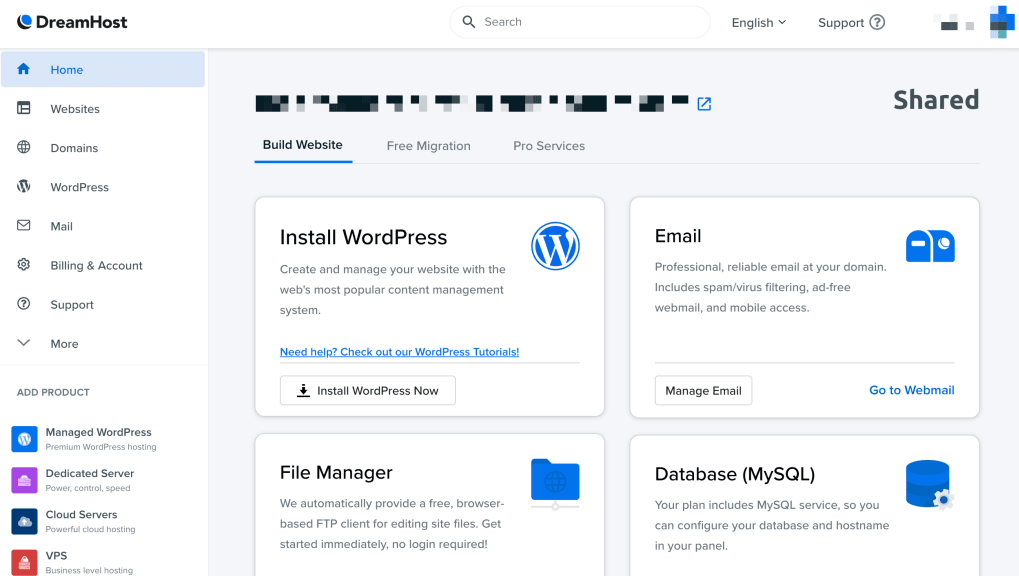
On the other hand, DreamHost utilizes a custom-built control panel tailored to provide a seamless site management experience. The panel is user-friendly, featuring advanced tools like SFTP, Shell Access, and WP-CLI, which cater to more experienced users as well. This control panel streamlines administration while providing easy access to key functionalities. Both SiteGround and DreamHost emphasize user accessibility, but SiteGround’s admin panel is notably geared towards simplifying the user experience.
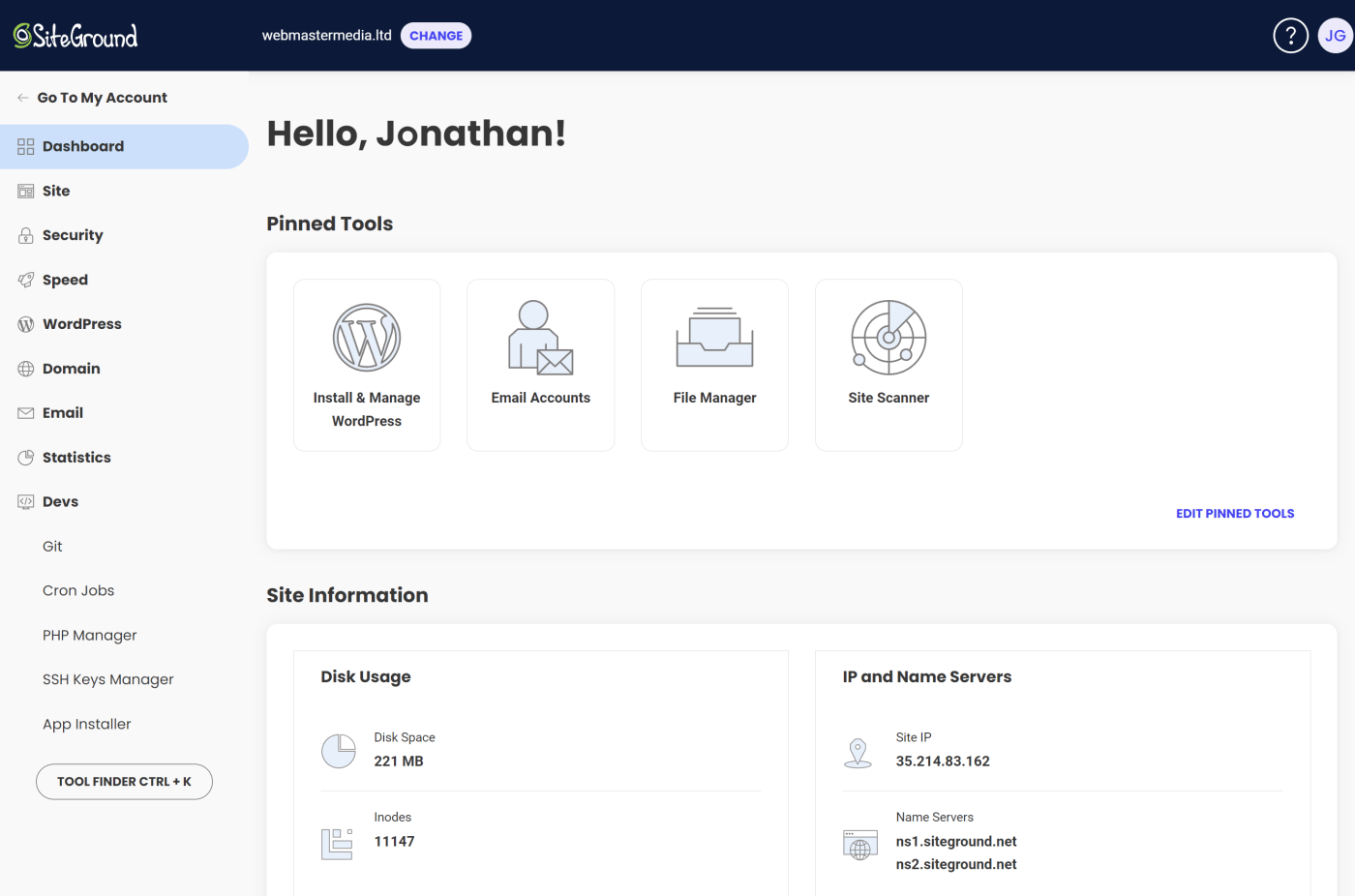
SiteGround simplifies site migration with its free WordPress Migrator Plugin, allowing users to transfer their sites without incurring additional costs. For more complex migrations, professional expert migration services are available at a nominal fee. DreamHost also supports migration with a user-friendly Migration Dashboard, offering a guided process for manual migration options. While both providers offer free automated tools, DreamHost lacks the specific free WordPress plugin that SiteGround provides, making SiteGround marginally more accommodating for WordPress migrations.
SiteGround offers an extensive knowledge base and pinned support articles on every page, ensuring users have quick access to help. Their automated solutions provide instant responses to common inquiries, and their support team is highly rated with fast response times. DreamHost also provides robust support through their comprehensive knowledge base and 24/7 chat and email support. Both hosting providers excel in providing valuable resources, but SiteGround’s proactive, pinned help articles enhance immediate user assistance.
User management
accessibility.
Score Components:
- Role customization (40%): Flexibility in creating and defining user roles and
permissions. - Ease of management (30%): User interface and tools for managing users.
- Access control (20%): Effectiveness of access control measures for different user
levels. - Scalability (10%): Ability to manage a growing number of users efficiently.
 8.4
8.4
 8.1
8.1
🏆 Winner SiteGround: A well-rounded user management system with efficient collaboration tools.
SiteGround and DreamHost differ significantly in their user management features. SiteGround allows adding team members as collaborators who get individual logins to their own SiteGround accounts. It provides a system to create custom roles from the Client Area and assign specific tools to each role. You can grant white-label access, allowing clients to manage their websites without seeing the SiteGround brand. DreamHost offers unlimited SFTP users, SSH access, and a control panel to manage domains, FTP, mail, and more. While DreamHost facilitates secure logins and source code management with a Subversion repository, SiteGround’s flexibility in creating and managing custom user roles makes it a more comprehensive solution for user management.
In terms of user interfaces, SiteGround offers a streamlined process to manage users and roles through the Client Area. You can add collaborators, create custom roles, and manage user permissions easily. Meanwhile, DreamHost provides a custom-built control panel that centralizes the management of domains, email, FTP, and other administrative tasks. DreamHost’s interface is designed to be user-friendly, although it may lack some of the sophisticated role-based access features available with SiteGround.
Assessing the effectiveness of access control measures, SiteGround stands out with its white-label client capability, allowing clients to access Site Tools without brand exposure. This feature, along with role customization and individualized support access for collaborators, makes SiteGround capable of efficiently managing a growing number of users. DreamHost, while strong in providing secure access methods like SFTP and SSH and tools like Cron and password protection, doesn’t match the customizability and white-label features that SiteGround offers.
SiteGround user roles table:
| Role | Description | Access highlights |
|---|---|---|
| Collaborator | A team member who helps build or maintain your site. | Access to Site Tools; personalized support and SiteGround Account login. |
| White-label Client | A client who manages their own site via Site Tools without SiteGround branding. | Access to Site Tools from a white-label URL; site-specific management. |
| Custom Role | A role created by you to grant specific tool access to a client. | Access to selected tools assigned during role creation. |
DreamHost user roles table:
| Role | Description | Access highlights |
|---|---|---|
| SFTP User | A user given access to the hosting data via secure SFTP. | Secure file transfers; restricted server access. |
| SSH User | A user with command-line access to the server. | Secure remote server administration. |
| Email User | A user with an email account @yourdomain. | Email storage, syncing features, and security filters. |
Customer support
hosting provider.
Score Components:
- Support communication channels (30%): Measures the variety of customer support types
provided (live chat, chatbot, email, phone, etc.) - Availability (20%): Assesses the availability hours for each channel, including 24/7
support options. - Technical support quality (30%): Assesses whether the provider offers comprehensive
technical support, including hardware upgrades (e.g., HDD to SSD), software installations, and web
server configuration changes. - Enterprise support (20%): Checks if there are dedicated or priority support services
for enterprise-level customers.
 9.2
9.2
 8.3
8.3
🏆 Winner SiteGround: Offers extensive support channels and highly trained staff.
 |
 |
|
|---|---|---|
Phone support |
||
Live chat support |
||
Chatbot |
||
Email/ticket support |
||
Enterprise support (dedicated agent, priority support) |
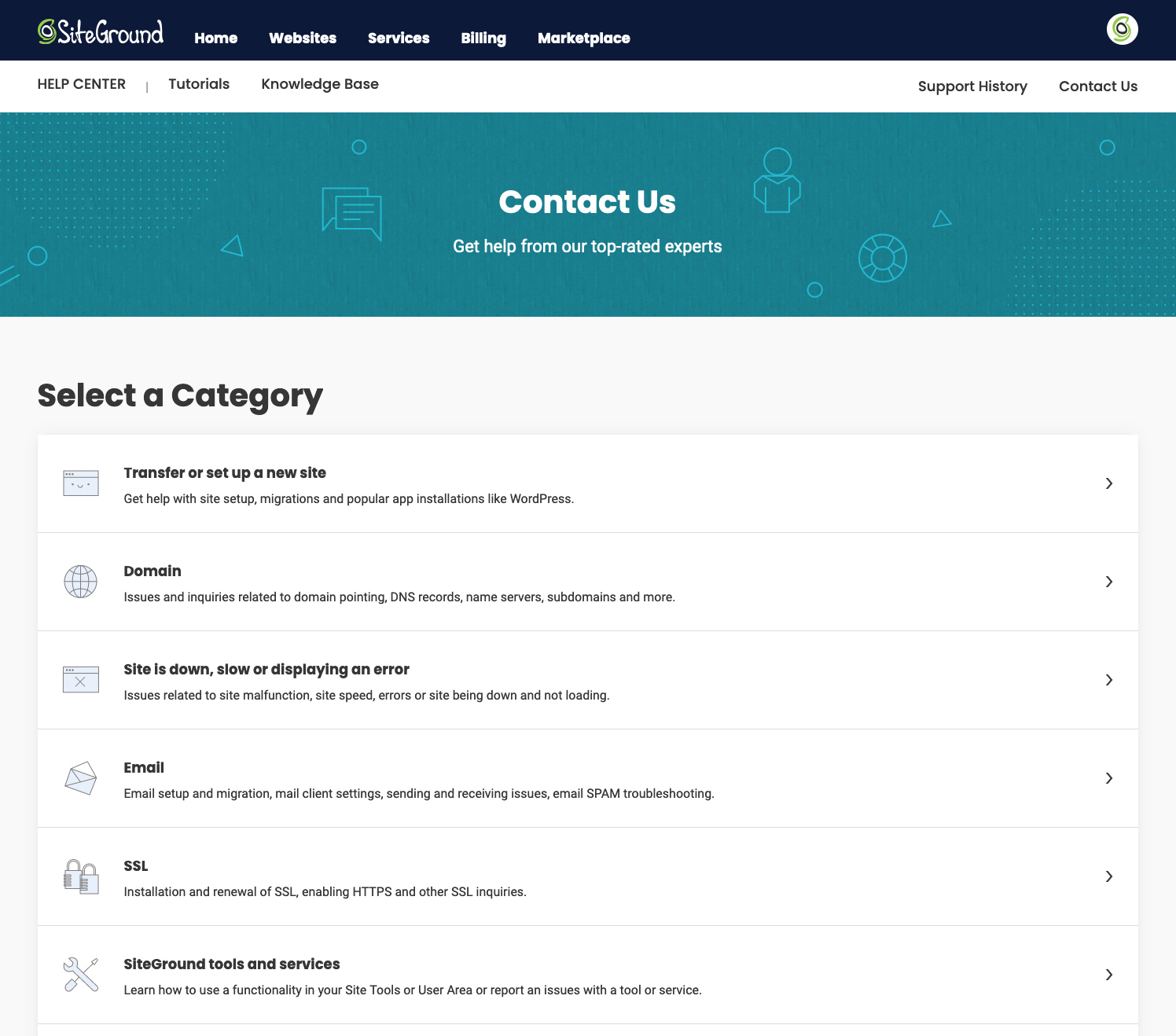
SiteGround and DreamHost both provide 24/7 customer support, but SiteGround shines with its wide array of support channels. SiteGround provides live chat, phone support, helpdesk tickets, automated solutions, and has a high customer satisfaction rate. Their staff undergoes intensive training and consistently receives excellent ratings for their proficiency and friendliness. Additionally, SiteGround offers priority support via its GoGeek plan, ensuring faster resolutions for the most critical issues.
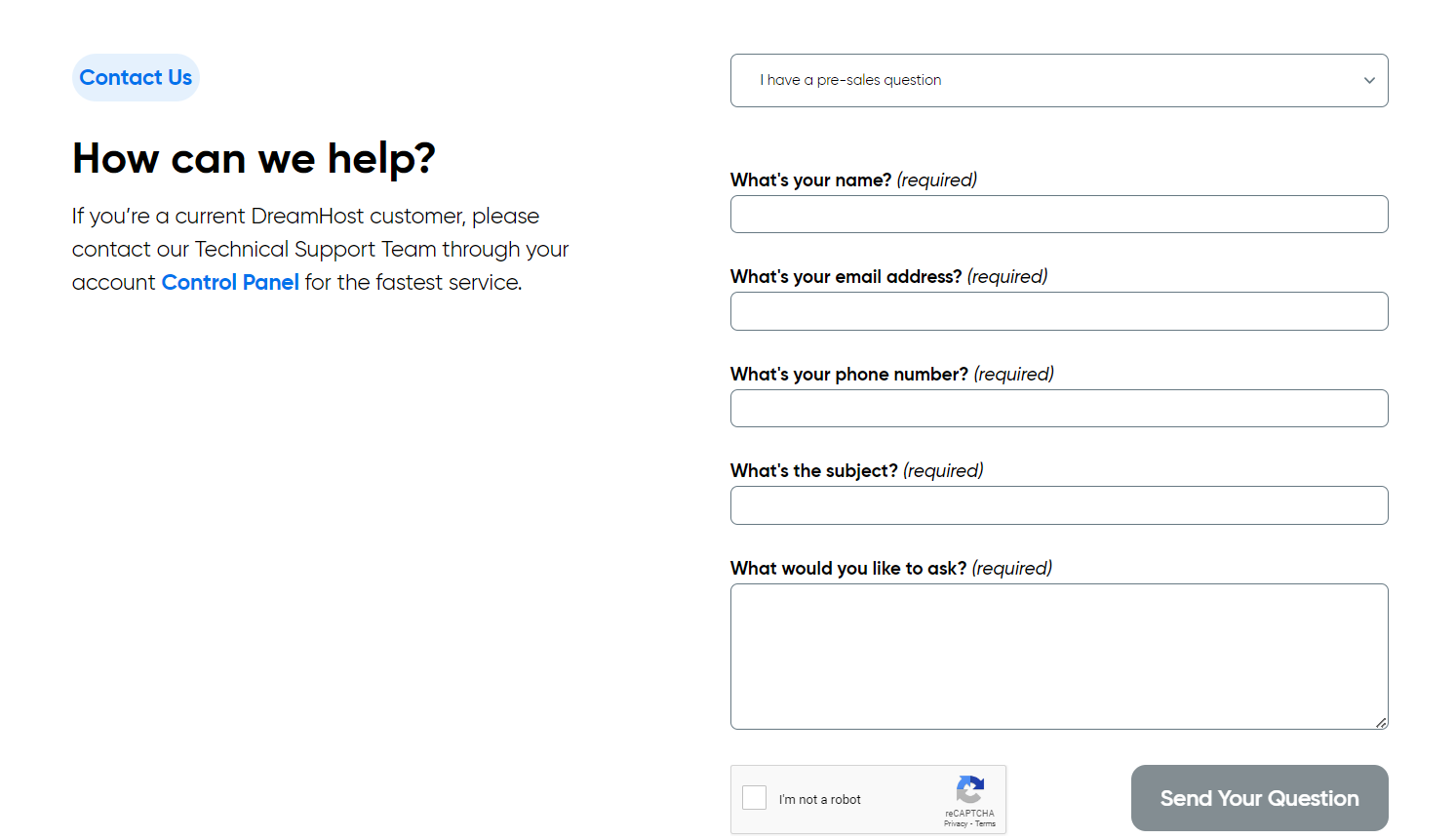
DreamHost offers comprehensive support with live chat, email, and a ticket system available 24/7. However, direct phone support is not available—callbacks can be requested for an additional fee, and their professional services come at extra costs. Although the response times are swift, SiteGround’s customer service is more accessible and versatile, making it the superior choice.
Siteground vs Dreamhost: User feedback
SiteGround garners consistently high praise for its exceptional customer support and user-friendly tools, frequently being described as reliable and straightforward to use. Users commend the fast and knowledgeable technical assistance, which is available through various channels like chat and phone, often highlighting the effectiveness and patience of support representatives. Despite these positive aspects, some users find renewal pricing relatively expensive and note that navigating to the support section can be cumbersome. Issues with specific features, such as webmail interface and certain plugins, are also mentioned, but overall, SiteGround is recommended for its strong support and ease of use, especially for beginners and small businesses.
DreamHost is a well-regarded hosting provider praised for its reliability, affordable pricing, user-friendly interface, and excellent performance. Users especially appreciate the responsive customer support, the easy navigation of the web portal, and a variety of hosting options suitable for different needs. However, common criticisms include the lack of phone support, occasional slow response times from customer service, and some challenges related to advanced functionalities and site migrations. While the majority of users report positive experiences, a few have faced significant issues with downtime and customer service, impacting their overall satisfaction.
Siteground vs Dreamhost: FAQ
Which platform is better suited for hosting WordPress websites?
Both SiteGround and DreamHost are well-suited for hosting WordPress websites, providing comprehensive WordPress-specific hosting plans with advanced features. SiteGround offers high performance with custom PHP and MySQL implementations and extensive caching methods, while DreamHost excels with affordability and includes built-in caching in its plans. The choice depends on whether you prioritize performance and advanced caching (SiteGround) versus affordability and basic features (DreamHost).
Which hosting service offers better security features?
SiteGround offers robust security features, including an AI anti-bot system, a smart web application firewall (WAF), daily backups, and free SSL certificates managed through Let’s Encrypt. DreamHost also provides strong security measures such as free SSL certificates, DDoS protection, and malware scanning through DreamShield. However, SiteGround’s multi-layered security managed by Google Cloud and additional features like automated WordPress updates give it an edge over DreamHost.
Which platform offers better customer support?
SiteGround excels in customer support with 24/7 availability through live chat, phone support, email/ticketing, and a helpdesk. Their support team is known for quick, knowledgeable, and friendly responses. DreamHost also offers comprehensive support via live chat and email/ticket systems but lacks direct phone support, only offering callbacks for an additional fee. Consequently, SiteGround’s more accessible and versatile support channels make it the superior choice.
Which hosting service offers more scalability options for growing websites?
SiteGround provides several scalable options, including GrowBig and GoGeek plans with advanced features and easy upgrading to cloud hosting plans that start at $100/month. DreamHost offers scalable options as well, starting with VPS hosting at $10/month and dedicated hosting at $199/month, with expandable RAM and storage. While both support elastic scaling, SiteGround’s variety of plans and straightforward upgrading options make it slightly more versatile for growing websites.
What are the major differences in pricing and value between SiteGround and DreamHost?
SiteGround’s hosting plans start at $3.99/month, offering extensive features like daily backups and free SSL, but higher initial and renewal rates can be a drawback. DreamHost offers more affordable options, starting at $2.59/month, with benefits like free domain registration for the first year and unlimited storage. While SiteGround’s plans are seen as higher value due to their robust features and performance, DreamHost stands out for affordability and extensive basic and intermediate features.
What are the differences in the control panels offered by each hosting service?
SiteGround offers a custom-built control panel designed to be user-friendly, making setup and management straightforward with automated wizards and one-click tools. DreamHost also uses a custom-built control panel that provides a seamless site management experience with advanced tools like SFTP and WP-CLI, catering to more experienced users. While both emphasize user accessibility, SiteGround’s admin panel is notably geared towards simplifying the user experience for beginners.
The making of this blog
We followed a clear, step-by-step process to write and research this article.









